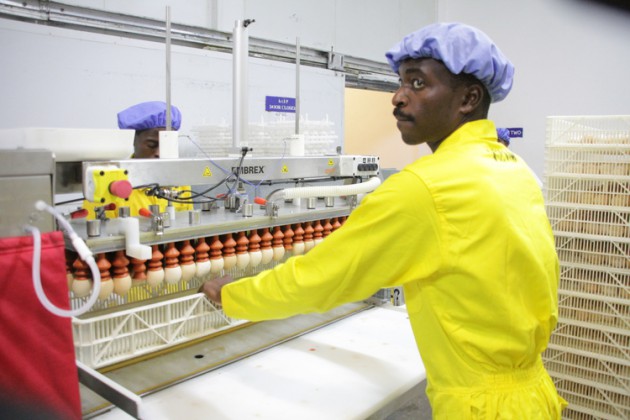
Irvines Zimbabwe employees monitor the vaccination of eggs by an Embrex machine during a tour of the company’s operations by the Parliamentary Portfolio Committee on Agriculture, Lands, Mechanisation and Irrigation last Friday
Business Reporter
Capital projects earmarked for implementation by Irvines Zimbabwe this year are under threat due to the prevailing foreign currency shortages in the country, chief executive David Irvine said. The stock feeds and chicken breeding company has lined up capital projects amounting to $4 million that will see the revitalisation of its layer operations. Mr Irvine said the company is committed to investing in the latest technology hence the need for new capital projects.
“We are doing some capital projects on our layer operations and that is dependent on us being able to get foreign currency. Again what we are trying to do is to reduce the cost of eggs.
“If we can get the cost of eggs down, that means everyone will be able to afford eggs. All these capital projects are earmarked for this year but our worry remains that of getting enough foreign exchange,” said Mr Irvine.
Mr Irvine was speaking on the sidelines of a visit by the Parliamentary Portfolio Committee on Lands, Agriculture, Mechanisation and Irrigation to assess his company’s operations. Zimbabwe has been facing foreign currency challenges since October last year. This has partly been due to declining exports while local banks nostro accounts are depleted.
This situation has also caused delays in settling foreign payments and cash shortages in Zimbabwe as banks also use the same account balances to import cash. Irvines Zimbabwe has not been spared the challenges as the company depends on imported raw materials and equipment among other things.
Mr Irvine said the company’s operations are dependent on availability of enough foreign exchange. “Our biggest concern is the availability of foreign exchange. We are dependent on foreign exchange for our processes and chemicals, all vitamins and stock feed ingredients.
“We need foreign exchange to keep going and we think we are not getting enough. A lot of foreign exchange at the moment is being diverted to maize which is our biggest input item,” said Mr Irvine.
“The other concern is the delay in getting permits and the cost of permits. For one to get an import or export permit is a challenge at the moment and that needs to be addressed. The recent imposition of value added tax on meat products also depressed chicken sales by probably 15 to 25 percent,” he said.
Mr Irvine added that the company’s production capacity has kept going down due to liquidity challenges affecting the economy. He said Irvines Zimbabwe has a factory with a capacity to produce about 300 000 chickens a week but capacity is currently around 190 000.
The company has already commissioned a $6million stock feed plant with three silos with a capacity of holding 9 000 tonnes of maize and soya beans.
